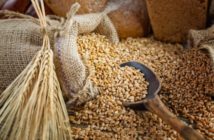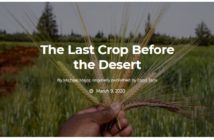By: IDN
By Jerome Mwanda
Some 19 million people in West Africa’s Sahel region are living with the threat of hunger and malnutrition, though the potential to increase agricultural production in Africa is enormous. Poor people in the slums of Nairobi pay more for their maize, rice, and other staple food than wealthy people pay for the same products in local supermarkets.
Such asymmetries are surmountable – if only African leaders would agree to improve inter-regional trade so that food can move more freely between countries and from fertile areas to those where communities are suffering food shortages, says the World Bank in a new report.
Africa
 The 106-page report titled ‘Africa Can Help Feed Africa: Removing barriers to regional trade in food staples’ says the dismantling of trade barriers would not only create a competitive food market that will help poor people most, but would also generate an extra US$20 billion in yearly earnings for the continent.
The 106-page report titled ‘Africa Can Help Feed Africa: Removing barriers to regional trade in food staples’ says the dismantling of trade barriers would not only create a competitive food market that will help poor people most, but would also generate an extra US$20 billion in yearly earnings for the continent.
The report was released on October 24 ahead of an African Union (AU) ministerial conference on agriculture and trade, scheduled to be held in Addis Ababa from October 29 to November 2, 2012, but was postponed because of “the low response/confirmation of attendance by Member States”. The African Press Organisation (APO) reported that “it was difficult for the (AU) Commission to attain the mandatory quorum for convening a Ministerial Conference”.
The World Bank expects demand for food in Africa to double by the year 2020 as people increasingly leave the countryside and move to the continent’s cities. Rapid urbanization will challenge the ability of farmers to ship their cereals and other foods to consumers when the nearest trade market is just across a national border, says the report.
Countries south of the Sahara, for example, could significantly boost their food trade over the next several years to manage the deadly impact of worsening drought, rising food prices, rapid population growth, and volatile weather patterns. The report underlines the importance of food distribution networks which in many countries fail to benefit poor farmers and poor consumers.
With many African farmers effectively cut off from the high-yield seeds, and the affordable fertilizers and pesticides needed to expand their crop production, the continent has turned to foreign imports to meet its growing needs in staple foods, informs the report. Though, given removal of restrictions in trade, it does not have to.
Because, as World Bank Vice President for Africa Makhtar Diop said: “Africa has the ability to grow and deliver good quality food to put on the dinner tables of the continent’s families. However, this potential is not being realized because farmers face more trade barriers in getting their food to market than anywhere else in the world. Too often borders get in the way of getting food to homes and communities which are struggling with too little to eat.”
Unpredictable
The new report suggests that if the continent’s leaders can embrace more dynamic inter-regional trade, Africa’s farmers, the majority of whom are women, could potentially meet the continent’s rising demand and benefit from a major growth opportunity. It would also create more jobs in services such as distribution, while reducing poverty and cutting back on expensive food imports. Africa’s production of staple foods is worth at least US$50 billion a year.
The report further notes that only five percent of all cereals imported by African countries come from other African countries while huge tracts of fertile land, around 400 million hectares, remain uncultivated and yields remain a fraction of those obtained by farmers elsewhere in the world.
Transport cartels are still common across Africa, and the incentives to invest in modern trucks and logistics are weak. The World Bank report suggests that countries in West Africa in particular could halve their transport costs within 10 years if they adopted policy reforms that spurred more competition within the region.
Other obstacles to greater African trade in food staples include export and import bans, variable import tariffs and quotas, restrictive rules of origin, and price controls. Often devised with little public scrutiny, these policies are then poorly communicated to traders and officials. This process in turn promotes confusion at border crossings, limits greater regional trade, creates uncertain market conditions, and contributes to food price volatility.
“The key challenge for the continent is how to create a competitive environment in which governments embrace credible and stable policies that encourage private investors and businesses to boost food production across the region, so that farmers get the capital, the seeds, and the machinery they need to become more efficient, and families get enough good food at the right price,” said Paul Brenton, World Bank’s Lead Economist for Africa and principal author of the report.
The World Bank is a key source of knowledge on trade policy issues, analysis and investments for trade-related infrastructure at the country level. The institution’s agriculture support for Africa has grown significantly over the past decade, according to the Bank. Concessional lending totalled US$1.07 billion in fiscal year 12 (July 11-June 12): a fourfold increase from financial year 2003.
The share of trade-related lending in total Bank lending has also grown from an average of two percent in 2003 to five percent in 2012. New trade-related commitments in 2013 are expected to increase to US$3 billion, 70 percent of which will go to Africa.
Since 2008, World Bank Group lending for agriculture and related sectors in sub-Saharan Africa total approximately US$5.4 billion.
About the author:
IDN
IDN-InDepthNews offers news analyses and viewpoints on topics that impact the world and its peoples. IDN-InDepthNews serves as flagship of GlobalNewsHub – the media network of the Globalom Media Group andGlobal Cooperation Council.
.






